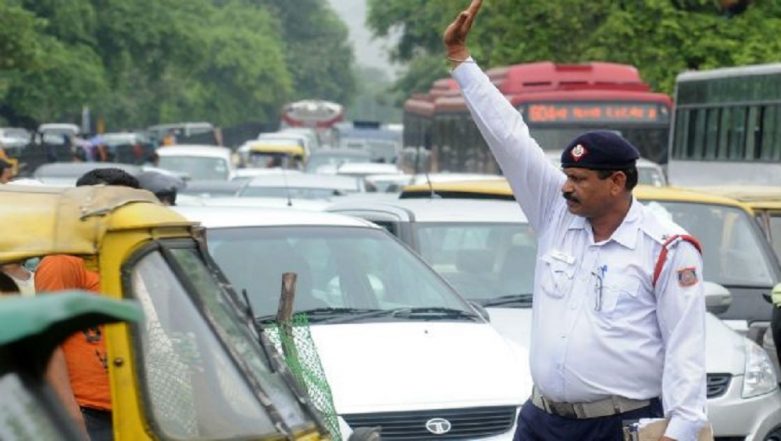
Road discipline needs education, higher fines alone won’t help

“When you don’t care for your own life while over-speeding, why make so much fuss about speed tickets and higher penalties?” — this was how a senior traffic official in Uttar Pradesh government responded when asked for his reaction on the recent hike in traffic violation penalties.
Around 150,000 lives are lost every year in road accidents in India and the recent hike in penalties has triggered an uproar across the country.
Shankar Singh, an RTO official in UP’s Barabanki who has served in different cities of the state, feels that the hikes are justified.
“Though people are generally complaining that the fine is very high and traffic police are behaving in a rude manner, it will definitely bring down the number of accidents and deaths,” he said.
Earlier hardly 40 per cent two-wheeler riders used to wear helmets in UP towns but now it has gone up above 90 per cent, he said, adding, “It is a healthy sign.”
Also read: Public outrage forces BJP-ruled states to dilute MV Act
Singh noted that over-speeding and rash driving was common on UP’s expressways.
“In small towns, where the roads are narrow, traffic is erratic and other measures need to be taken, like putting up speed-breakers and road dividers, and deploying more traffic police,” he said.
Subhash Kushwaha, an RTO official in Lucknow, concurred with him and said that without educating people about road discipline, these penalties will be seen as harassment only.
“On the Lucknow-Faizabad stretch itself, there are five accidents every day on an average. If the roads are not good, dividers are not properly erected, speed-breakers are not scientifically constructed, and if there are no separate lanes for two-wheelers and for heavy vehicles like tractors and trolleys, and if the chaurahas (four-way crossings) have no proper capacity to divert traffic, the rules would not be followed properly,” he said.
“Will cows follow traffic rules?” he wondered. “They roam freely on the roads as there is no proper fencing.”
An RTO official has to issue 100-200 driving licences a day, but there are no proper test-tracks to cross-check drivers’ abilities, he lamented.
According to Dinesh Mohan, honorary professor at IIT-Delhi and a key architect of the Transportation Research and Injury Prevention Programme, “International experience suggests that the roads and vehicles have to be designed keeping the needs and limitations of road users in mind.”
Also read: Odisha truck driver fined ₹86,500, highest under new MV Act
“For example, if there are no wide, smooth and clean footpaths in cities, people will walk everywhere possible on the road. If there are no convenient and safe pedestrian crossings every 300–500 meters, they will cross wherever possible. Similarly, if there are no convenient right turns for vehicles at least every kilometre in cities, many will drive on the wrong side. Most roads in all cities of India are badly designed and not convenient to use. Therefore, people have to break the rules,” he said.
He said there was a need to design urban roads to keep the speed below 50 kph and have speed-breakers every 80 metres in residential areas.
“International experience suggests that to reduce accidents, the police should focus mainly on speed violation, helmet and seatbelt use, and drinking and driving,” he said.
The professor also drew a comparison between the first hike in 1988 and the latest, saying the fines back then were as high or higher than the new fines today.
However, he stressed that higher fines alone cannot successfully tackle the problem. “If the Motor Vehicle Act (MVA) of 1988 was not that successful, it is unlikely that the new rules will have much effect a few months down the line, when the debate dies down.”
In his opinion, except for checking speed violation, helmet and seatbelt use and drinking and driving, fines for most other violations are not expected to reduce deaths much. Almost no country in the world that has been successful in reducing accidents has depended mainly on punishment of road users as an important strategy, he pointed out.
Citing a study by the Institute of Road Safety Research (SWOV), The Netherlands, he said that a combination of enforcement and penalties prevent violation of traffic regulations and increase road safety.
Also read: Stringent traffic rules of new motor vehicle law leave many states at crossroads
When road users consider the subjective probability of detection to be sufficiently likely, they will avoid violating a regulation. Road users adapt their behaviour even without being punished if there are frequently-conducted and visible traffic checks. Making penalties heavier, as an isolated measure, has been found to have little extra effect, according to the study.
Private taxi operators have however voiced their opposition to the hefty hikes in fines, according to Babloo, a tourist taxi operator in Allahabad.
“We are being arbitrarily fined for vehicle exhaust fumes being above limit. We have no means of proving that they are within limits,” he rued and alleged that public transport buses and other government vehicles are the biggest polluters.
“About 99% of these vehicles are highly polluting because there is no proper maintenance and these vehicles are never booked. Before taking action against us, let them first keep their own house in order,” he demanded.
Babloo also called for proper laying of roads. “There are potholes even on the highways and when it is raining, there is water on the highway and potholes are not visible and how can you drive even at normal speed? The government needs to do a lot,” he said.

